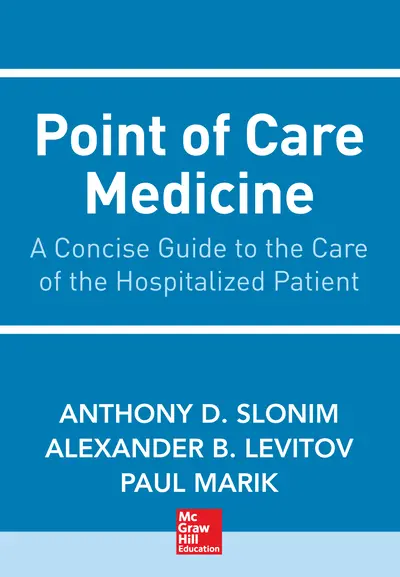My Account Details

ISBN10: 0071813357 | ISBN13: 9780071813358

Step 1 . Download Adobe Digital Editions to your PC or Mac desktop/laptop.
Step 2. Register and authorize your Adobe ID (optional). To access your eBook on multiple devices, first create an Adobe ID at account.adobe.com. Then, open Adobe Digital Editions, go to the Help menu, and select "Authorize Computer" to link your Adobe ID.
Step 3. Open Your eBook. Use Adobe Digital Editions to open the file. If the eBook doesn’t open, contact customer service for assistance.
An ultra-concise, evidence-based guide to the initial patient encounter
Point of Care Medicine delivers the most patient-care information in the least amount of words possible. Within its pages you will find the evidence-based information necessary to immediately manage the most common problems occurring in hospitalized adult patients--ranging from chest pain and renal failure to anemia and complications of pregnancy.
I. Diseases of heart and great vessels
II. Pulmonary and pulmonary vascular disease. Industrial illnesses of the lungs. Disorders of sleep. Special considerations in morbidly obese.
III. ENT, diseases of oral cavity and diseases of neck and upper airways
IV. Ophthalmology and eye examination
V. Diseases of the Gastrointestinal tract and hepatology
VI. Diseases of kidney and urinary system. Diseases of homeostasis.
VII. Pelvic diseases, gynecology and obstetrics for non-obstetrician.
VIII. Testicular diseases
IX. Hematological and oncological diseases. Care of bone marrow transplant patients, and those receiving chemotherapy. Special considerations in Sickle cell disease patient
X. Infectious diseases. Antibiotic, antifungal and antiviral drugs. Care of patient with HIV on and off HAART. Foreign borne and traveler illnesses
XI. Endocrinology and Metabolic disorders
XII. Rheumatologic and connective tissue diseases
XIII. Peripheral vascular diseases arterial and venous
XIV. Neurology and neuromuscular disorders
XV. Psychiatry for non psychiatrist
XVI. Skin diseases and skin signs of systemic illness
XVII. Allergic and drug related illnesses, Neuroleptic Malignant Syndrome and Serotonin Syndrome. DOD, poisons and antidotes.
XVIII. Environmental illnesses, accidental hypothermia and hyperthermia
XIX. Evaluation of trauma and postoperative patient for non surgeon. Surgical “clearance”
Supplements:
- Common procedures guide
- Algorithms for 10-15 common problems
- Glossary and abbreviation guide
- ACLS
- ICU survival guide
- Commonly used protocols
- Pictorials ( Anatomy, EKGs, Echoes, CXR etc large icon size)
- Commonly used formulas and calculation : i.e. anion gap, osmolar gap, Aa gradient etc.
- Index
Need support? We're here to help - Get real-world support and resources every step of the way.